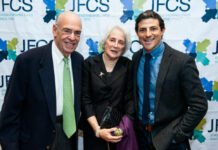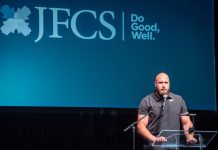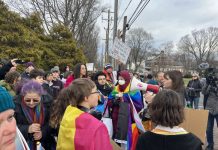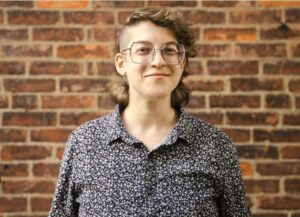
At all events for Jewish Family and Children’s Service of Greater Philadelphia, Galia Godel, program manager of JFCS’s LGBTQ Initiative, wears a small pin with a pink triangle on it.
The symbol was originally used in Nazi concentration camps to mark gay men, but it was reclaimed by the AIDS Coalition To Unleash Power, or ACT UP, movement of the 1980s to draw attention to the disease’s disproportionate impact on the queer community. ACT UP’s slogan “Silence = Death” is printed in Yiddish on Godel’s pin.
Since the AIDS crisis, the pink triangle has become a symbol of solidarity and resilience among LGBT people.
On June 15, Godel, among other Jewish LGBT leaders in the Philadelphia community, participated in a panel about the Jewish and LGBT origins and the changing meaning of the pink triangle as part of the Weitzman National Museum of American Jewish History’s Pride Month programming.
While the rainbow flag has become the most common symbol of the LGBT community to its allies, the pink triangle retains its importance within the queer community. Godel, 32, was drawn to the intersection of Jewish and queer history in its origin, which mirrors her identity.
“When I came out, I was 12 or 13 and didn’t know that much about history or queer politics. But as I learned more about the community that I was a part of … I really loved that connection between the pink triangle as a symbol of queer liberation and the knowledge of Holocaust history,” Godel said.
Originally from the Philadelphia area, Godel came out to friends at NFTY: The Reform Jewish Youth Movement and Camp Harlam. Outside of her career, she’s the leader of the LGBT havurah at Kol Tzedek, where she is a member.
Godel is the grandchild of Rabbi Simeon Maslin, the spiritual leader of Reform Congregation Keneseth Israel for 17 years and former president of the Central Conference of American Rabbis. Her family has a history of being strongly integrated into Jewish life, and Godel is no exception.
“I grew into my identity as a queer teenager, through this lens … of a Jewish existence as well,” Godel said.
Godel draws similarities between Jewish and queer histories beyond her own: Each group had to fight to be visible and accepted.
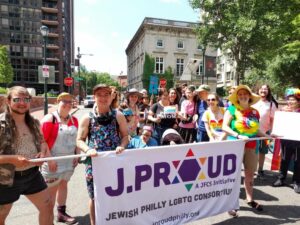
“There’s the expectation that if we just keep our heads down, don’t tell everyone who we are, that we will be safe, that we will be palatable, that people won’t hate us as long as we just keep quiet about it, which is absurd,” Godel said. “No one’s ever going to stop hating us just for pretending to not be who we are or trying to pass as part of the mainstream.”
Both the Jewish and queer communities focus on keeping their communities safe, Godel argues. The values of pikuach nefesh, saving a life, and believing every person has a divine spark are what inform her work at JFCS.
As program manager of the LGBTQ Initiative, Godel works within JFCS to ensure the organization’s programming is inclusive, equitable and accessible to LGBT people. She also conducts trainings and workshops for Jewish organizations hoping to increase their organizational inclusivity, and oversees the J.Proud consortium of 48 area Jewish organizations committed to LGBTQ equality.
According to Godel, it’s not enough for Jewish organizations to “slap a rainbow sticker on your front door and say, ‘Yes, yes, we support you. Please come to our synagogue.’” Organizations must be “loud allies,” she said, especially in times of increased legislation to limit visibility and care for transgender individuals.
As a queer Jewish person leading a queer initiative within a Jewish organization, Godel is never really off the clock. This means that hangouts with queer or Jewish friends can often end in brainstorming sessions, networking opportunities or ideas for new affinity groups or community services.
But it also means that Godel can bring her full self to her job and not worry about being a caricature of her identities or giving disingenuous answers.
“When someone asks a question about the LGBTQ Jewish community, I’m not checking my notes,” Godel said. “I’m checking my heart.”



